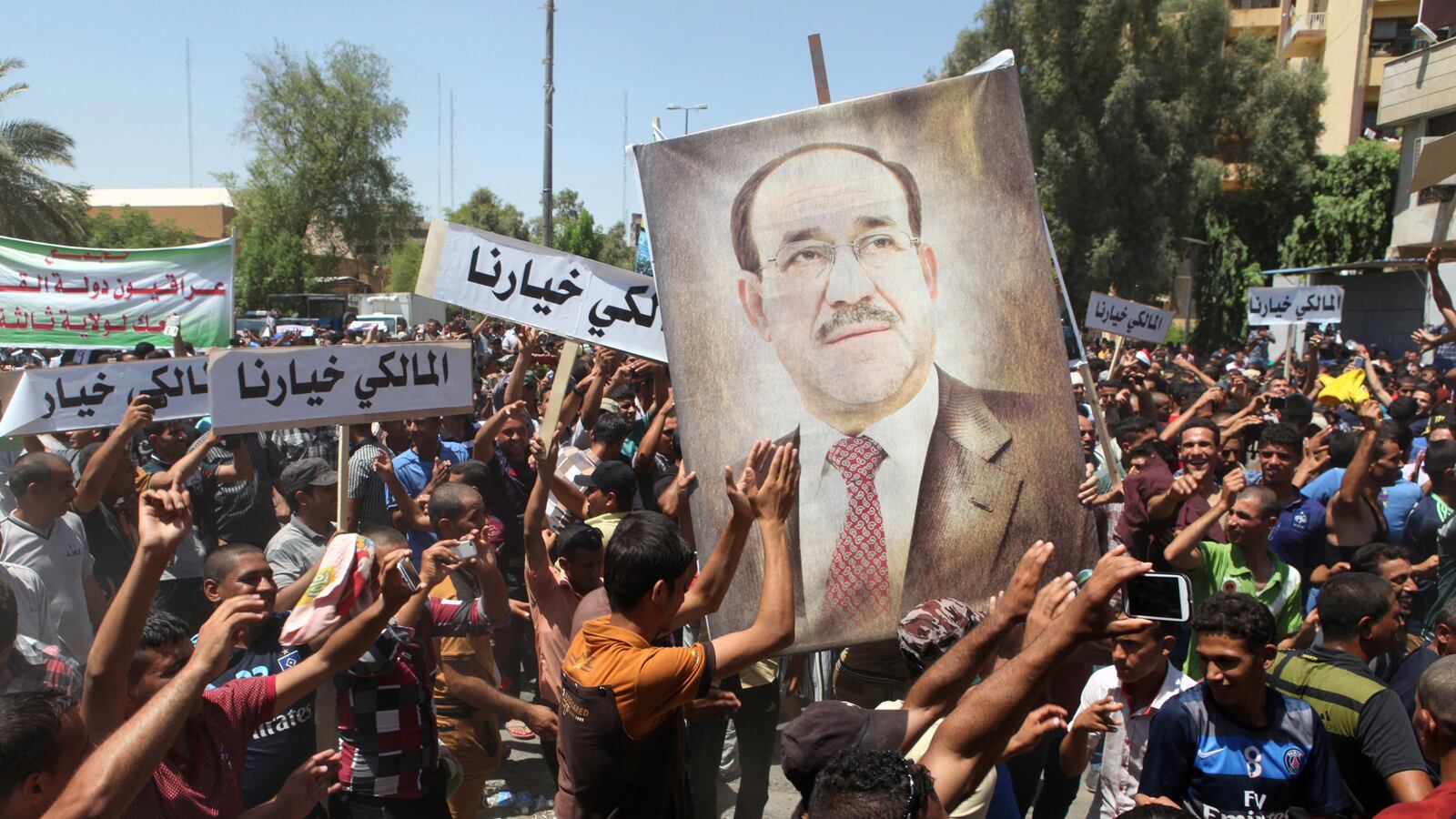The usually uninformed American citizens can be forgiven for being mystified by the Mideast policy prescriptions of their leaders. President Barack Obama promises to stop genocide in Iraq and not to do “stupid shit,” meaning virtually anything that might actually stop the genocide. Hillary Clinton rightly proclaims that avoiding “stupid shit” does not a strategy make, though she, too, vigorously opposes stupid shit. And television’s favorite administration critics—Republican Senators John McCain and Lindsey Graham—continue their heartfelt advocacy of stupid shit, i.e. more bombs dropped on the bad guys and more arms supplied to the good guys, without any thought whatsoever of what they’d do next in the likely event that this hardly decisive intervention failed. Please convince me that the lunatic jihadis who now infest Syria and Iraq are not the only ones who know what they’re doing.
You have to hand it to the jihadis. So far as I can tell there are only about 327 of them, riding in circles around the mountains to make it look like they have 2 million men under arms. Just like in the old movies. We hear various estimates of their numbers from intelligence agencies—11, 305, 15,001, 27, 345. (I’m kidding, but maybe so is the CIA.) In any event, their totals don’t begin to match the many hundreds of thousands of troops and security forces maintained by the Syrian and Iraqi governments. And jihadi arms don’t begin, not hardly, to rival the billions upon billions of dollars worth of arms the U.S. supplied to Iraq. (By the way, whatever happened to those arms?)
To be sure, the jihadis are now riding around in U.S. tanks and armored vehicles captured from the greatly superior Iraqi forces at the “battle” of Mosul. But maybe the jihadis are winning because they are better trained? You must be kidding me! Most of them never fired a gun until they showed up in Syria from the unemployment lines of Europe and America. And don’t forget, the jihadis don’t really have an air force, which might be another advantage (only kidding, again).
No wonder none of America’s or the West’s best trained intelligence officers predicted that the jihadis would conquer huge chunks of Syria and Iraq, seizing oil wells and dams. Who could have guessed the jihadis would be approaching Baghdad and Erbil (Kurdistan’s capital), pumping Iraqi oil and selling it to our NATO ally Turkey and pumping Syrian oil and selling it to their bitter enemy President Bashar al-Assad?
Of course, the answer is that “our guys,” the supposed good rebels in Syria and the democratically elected Shiite government of Prime Minister Nouri al-Maliki, are disunited. They are like the Republicans and Democrats in the U.S. Congress. Maybe you have to be united in order to fight hard—the jihadis are and we’re not (funny, Mideast experts are always highlighting the divisions among the Islamists). Perhaps their strength derives from their belief that Allah is on their side, while our “good guys” are seen by their soldiers as just a bunch of crooks. You would think, however, that the Allah-deficit might be overcome by our “good guys” fearing the jihadis will lop off their heads and steal their women. If one is being honest about the situation, however, it’s nearly impossible to figure out exactly why the jihadis are winning.
And if our guys would stand together in Washington, Iraq and Syria, what would they do? Would they fight, then? Would they fashion a plausible war policy? Aye, there’s the rub. What our leaders have been saying should not give us much hope.
McCain and Graham, the leading Republican voices on foreign policy, have only one answer to everything—military force. But they know better than most others that more U.S. air attacks and more arms to the Peshmerga are very, very unlikely to turn the tide of battle or save the pitiful Yazidis. They must know that even if Mr. Obama did what they said, it wouldn’t be nearly enough. And yet, as they always do, they’re silent on what they would do next. The next military step would have to be U.S. boots on the ground, but those words will never come from their mouths. It is also their pattern to ignore the political problems that underpin the bad military performances of our “good guys.”
To McCain and Graham, the bottled answer is always for America to fix the problem, and not the people we’re trying to help. By now, you would think that journalists should have tired of giving their vapid ideas yet another platform.
Hillary Clinton sounds much more sophisticated than these Republicans. She certainly knows how to court the intelligentsia; they rhapsodize when anyone says, “On the one hand, but on the other hand.”
Mrs. Clinton gave them just the sizzle they yearned for in a recent interview in The Atlantic. Her punch was harder than the ones recently delivered by former Defense Secretaries Bob Gates and Leon Panetta. Referring to Mr. Obama’s proclamation that the first axiom of his foreign policy is to avoid “stupid shit,” she said: “Great nations need organizing principles, and ‘Don’t do stupid stuff’ is not an organizing principle.” In other words, she was proclaiming that Mr. Obama has not had a foreign policy strategy and is unlikely to inspire one in his remaining years. Then, as is her way, she immediately backpedaled by saying that his axiom was likely just a “political message,” and not a reflection of his foreign policy. (Whatever that means.)
She also suggested that the current crisis in Iraq and Syria might have been avoided if Mr. Obama had adopted her proposal to arm moderate members of the Syrian opposition: “I know that the failure to help build up a credible fighting force of the people who were the originators of the protests against Assad…left a big vacuum, which the jihadists have now filled.” This newly-bold statement was undermined only sentences before, however, when she said that her plan would not necessarily have brought us to a “demonstrably different place.” Most depressingly, she never explains how beating up more on Assad would have weakened the jihadis, since Assad’s forces have been the only ones putting up a credible fight against them. Mr. Obama lovingly responded to Clinton’s whack at his Syria policy by calling it “Horseshit.”
Mr. Obama always says a lot of smart things—and mostly without Hillary-like hedges. Much more than most foreign policy blabbermouths, he is attuned to the underlying centrality of politics in most world problems, and to the need to seek diplomatic solutions. But though he is forever highlighting politics and diplomacy, he is never explaining exactly how his policies deal with the politics or how to make diplomacy work. And though he is forever mindful of the traps of military force, he has no real feel for how and when to use force and how to make it fit into an overall policy. Once there is any kind of crisis, he doles out little pieces of policy daily. So, one day it’s emphasizing the importance of preventing genocide against the Yazidis; the next, it’s not promising to prevent the genocide; the next it’s some airstrikes; the next it’s more airstrikes; then quiet about arming the Peshmerga; and then letting news of efforts to seriously arm the Peshmerga leak out. A few months ago it was backing Maliki as the democratically elected Prime Minister of Iraq, only to forsake democracy and Maliki now, in the name of the Iraqi “constitution.” Obama may view this as making sensible decisions in a step-by-step manner. To those trying to understand what he’s doing, they simply can’t follow him, let alone understand how the pieces and the day-to-day changes mesh.
Even after almost six years, Mr. Obama just doesn’t seem to get the point that his success as a leader depends directly on the understandability and persuasiveness of his strategies. To get support, he’s got to explain openly and repeatedly what the stakes are in various situations for Americans, what are the achievable objectives (not just desirable ones), and precisely how he proposes to use American power (or that of other countries) to attain those goals. Without such a strategic package, he will never conjure the necessary support to solve or manage tough problems.
What, then, is the right strategy for Iraq and Syria?
First, Mr. Obama must convince the public that the stakes are very high indeed for the United States and the West. If the jihadis are allowed to win in these battles and gain a strong foothold in the Middle East, all other neighboring nations will be seriously jeopardized. But these are not stakes for America alone. The costs are great for dozens of nations.
Second, the United States does not, in the 21st century, have the necessary power to combat the jihadis on its own; it must have partners and allies. The jihadis are a direct threat to Assad’s Syria, Russia, Iran, Saudi Arabia and the other Gulf States, Jordan, and Western Europe, to name a few. Washington has to forge a military coalition to fight the jihadis in Iraq and Syria, and all of these states have to contribute to the effort in one way or another. Yes, Moscow and Tehran are troublesome today for a variety of good reasons. That said, they feel as or more threatened by the jihadis, and would be as or more willing than Washington to contribute to the jihadi defeat. The issue here is a very practical one—which is the bigger threat, Assad or the jihadis, the jihadis or Iran? It’s way past time to put first threats first.
Third, fashioning this military/diplomatic coalition has to take priority over resolving nasty internal political problems in Baghdad and Damascus. Mr. Obama and his team seem to want to solve the political problems before they do anything else in a serious way. That will take too long and will be too risky. It’s critical to resolve all these problems, but it’s more critical to stop the jihadis now and drive them back. In the meantime, let Iraqi forces and various Syrians help where they can on the battlefield.
Fourth, let Americans and the world know that this enterprise will take time. Otherwise, the inevitably slow progress in turning the tide will be regarded as defeat. It will dissipate support for building the coalition and sustaining its efforts over the coming years. Mr. Obama is forever losing credibility because people think he’s failing. He’s got to define success so that he can achieve it. If Americans and others hear this strategy and believe in it, they will give him the necessary time to achieve victory.






